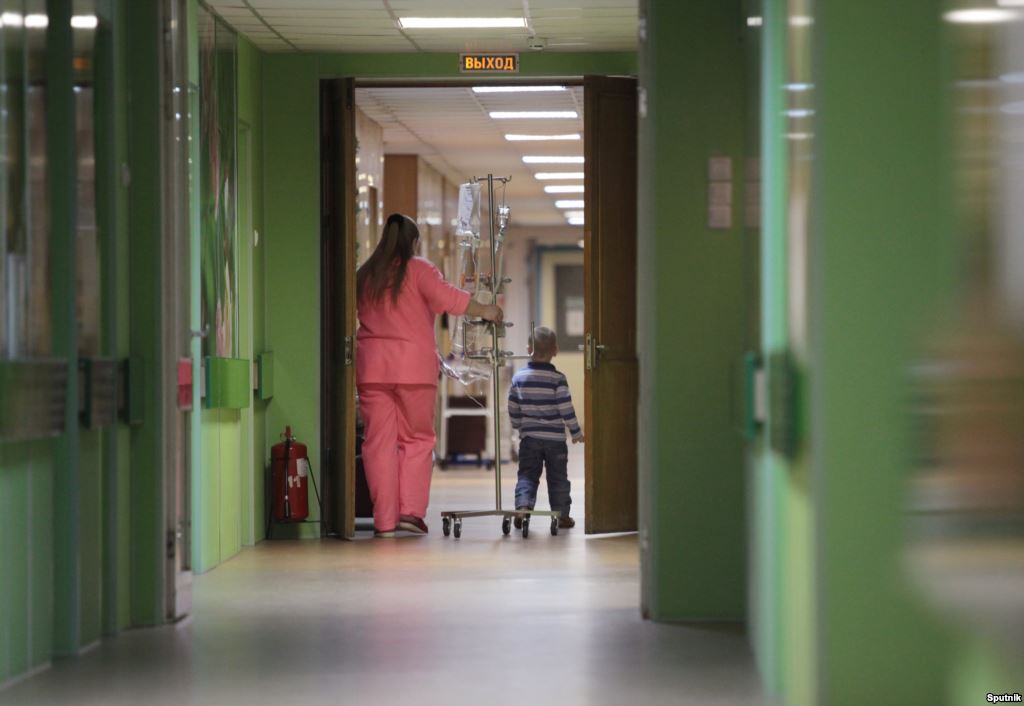Nurana Mammadova
3, 5% of the Georgian population is sick with thalassaemia. Medicians clarify that the disease is inherited and is mostly common among ethnic Azerbaijani population. The reason is so-called cousin marriages.
“I was 17 when I was compelled to marry my relative. Our families made decision without asking our opinions. Now, our daughter pays for our mistakes. She is sick with thalassaemia and we struggle to help her,” ethnic Azerbaijani resident of Tbilisi Sevange Musaeva (name is changed).
Modern medicine recognizes several forms of thalassaemia. When a person is sick with thalassaemia, the process of red blood cell circulation and renovation is disordered. Consequently, thalassaemia often is expressed in the form of anemia or hyper-hemoglobinemia.
“We did not know anything about this disease. The thalassaemia is inherited. As we have found out both my husband and I have gens of thalassaemia. We did not take medical tests before marriage but even if we had done that, we would not have understood anything because we did not have relevant information. Now my daughter is tortured with this disease. First symptoms were detected when she was a baby: she was pale, could not sleep at night, her belly swallowed and dwarfed. When we took her to a doctor, analysis showed low hemoglobin level in the blood. We went to Moscow for medical treatment.”
Doctors in Moscow diagnosed that Sevange’s daughter had thalassaemia. She is now 16 and needs transfusion of erythrocytes every second month. The medical treatment is very expensive and the family no longer can afford it; the patient needs transfusion of erythrocytes whole life. “We no longer can afford her medical treatment. I do not know what will happen with my daughter,” Sevange said.
Child of another ethnic Azerbaijani woman Arzu Valiyeva (name is changed) also has thalassaemia: “My husband is my cousin. We did not know anything about this genetic disease. My elder daughter, who has thalassaemia, is already 17. It is horrible to fight with this disease. The doctor told us she had chance of recovery only in case of marrow transplantation. Our second child could be a donor. After medical analysis we found out that he could not become a donor and we finally lost hope… person with thalassaemia needs permanent treatment and regular transfusion of erythrocytes. We do all our best to help her but now we also have financial problems. We have taken debts from all possible persons…”
Leman Vahabova (name is changed) is 17. She has thalassaemia and says that the disease does not hinder her to have normal life. “I hope to become a doctor to assist people with thalassaemia,” Leman said.
“Thalassaemia is a genetic disease and can be detected at the age of 6 months. There is big and minor thalassaemia. If both parents have this gen, there is big risk that their child will have big thalassaemia; however if only one parent has it, then a child may have a minor thalassaemia. Unlike the big one, the minor thalassaemia does not need much treatment. Population shall be aware of this problem to prevent so-called cousin marriages. If relatives get married, there is high risk that their child will be sick with thalassaemia,” pediatrician-hematologist Zaza Mtvarelidze said.
He said the thalassaemia is spread mostly among ethnic Azerbaijani people. “”Big thalassaemia is mostly detected among ethnic Azerbaijani people that is caused by close-relative marriages. 3, 5% of the Georgian population is sick with this disease. 80% of my patients are ethnic Azerbaijani people.”
“If we combat cousin marriages, we can avoid spread of the thalassaemia. Very often they confuse thalassaemia with anemia. Sometimes the sick person does not know that he/she has thalassaemia. Minor form of the disease does not require particular medical treatment but the patient should know that he has thalassaemia to avoid marriage with the person who also has thalassaemia. Both doctors and patients must be careful about it. It will be good if couples take analysis before getting married,” said Professor Marina Abashidze, director of the Georgian Institute of Hematology and Transfusiology.
People with thalassaemia can survive if they permanently transfuse erythrocytes. Considering the conditions of the patients, the transfusion may happen every month or every second month. After transfusion the level of iron rises in the blood that damages liver and spleen. To lower the level of iron patient needs additional treatment. A person can be completely cured from thalassaemia only with the marrow transplantation. Unfortunately, similar operations are not done in Georgia.
The article was prepared in the frame of the project implemented by Human Rights House Tbilisi with financial support of the Embassy of the Kingdom of Netherlands in Georgia. HRHT bears sole responsibility for the content of the article. The article does not necessarily reflect the views of the donor.
News
December 13, 2023
Ethnic minorities outside the peace dialogue
November 6, 2023
‘Peace’ agenda of political parties
Popular
Articles
February 13, 2024




